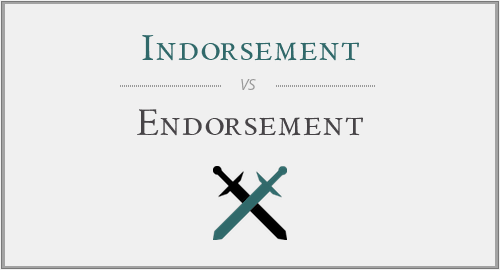You are probably used to spelling the word "endorsement" just like this, starting with "e". So it is natural that you are confused when you see it spelled "indorsement" on certain documents or in online publications.
So is it wrong or not? There are a lot of opinions, contradictions and debates on this, but let's analyze what each word means before concluding whether you can or you can't use both "indorsement" and "endorsement".
Indorsement vs. Endorsement
"Endorsement" is a noun, having its origin in the verb "to endorse", which refers to publicly and formally claiming your support for a person, an idea, an action (for something or somebody). "Endorsement", therefore, has the meaning of a publicly announced acceptance of something or somebody.
"Indorsement" is believed to be just another spelling for "endorsement". Some people claim it's wrong because it doesn't appear in all dictionaries and therefore does not exist in a correct grammar, while others consider it the US version. None of these opinions is correct, though. "Indorsement" does exist, but it's not just another spelling for "endorsement", as its meaning is much more narrowed. According to several law dictionaries, "indorsement" is a legal term for the acceptance of a contract. More exactly, it refers to the placing of the signature on the back of a negotiable instrument such as a check or a bill, with the purpose of making it transferable or cashable.
When do we use "indorsement"?
Only use "indorsement" when you are writing in the legal domain and referring to a signature placed on a contract or check.
Example: The check has the indorsement of the company CEO.
When do we use "endorsement"?
"Endorsement" is used to express a public agreement/acceptance, the formal and official support for a person or an idea.
Example: All the employees of the company publicly announced their endorsement of the new HR policies.
Conclusion
In the end, "indorsement" is somehow a different spelling of "endorsement", but its meaning is restricted and limited to the legal field. Therefore, while "endorsement" can easily replace "indorsement" without changing the meaning of the message too much, "indorsement" should not replace "endorsement" in any context.





Have a discussion about this article with the community:
Report Comment
We're doing our best to make sure our content is useful, accurate and safe.
If by any chance you spot an inappropriate comment while navigating through our website please use this form to let us know, and we'll take care of it shortly.
Attachment
You need to be logged in to favorite.
Log In